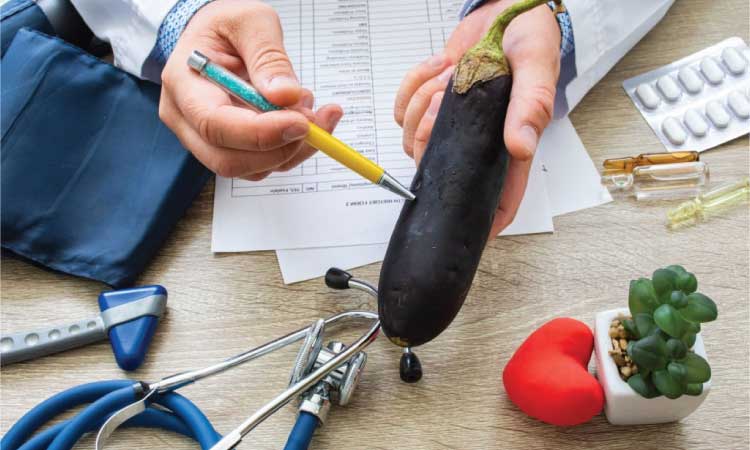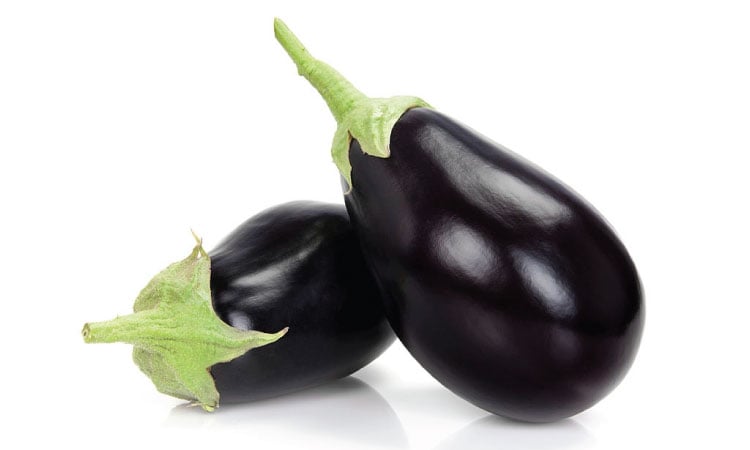Eggplant, also known as brinjal, is a highly nutritious vegetable. However, whether eggplant during pregnancy is safe or not has been much debated. While many experts claim it is safe if consumed in moderation, some people think eggplant is unsafe during pregnancy. This article helps you to know more about eating Indian eggplant during pregnancy. We also discuss its benefits and side effects.
Is It Safe To Eat Eggplant During Pregnancy?
It is usually safe to eat eggplant during pregnancy, as long as it is cooked properly. The stress is on cooking the eggplant properly, as eating foods that are cooked improperly during pregnancy is not wise and can be quite dangerous.
You should also make sure you are not allergic to eggplants. Eggplant is a member of nightshade family. Other members of this family are potatoes, tomatoes, and bell peppers.
If you have an eggplant allergy, it is best to avoid eating brinjals during this time.
Related Reading: 15 Fruits Not To Eat During Pregnancy
Nutritional Profile Of Eggplant
Eggplant is blessed with quite extensive vitamins and minerals. According to a source, eggplants are an excellent source of Vitamin B complex, vitamin C, Vitamin K, and Vitamin E. It is also rich in minerals like iron, phosphorous, copper, potassium, and manganese.
This vegetable is very low in saturated fat, cholesterol, and sodium. Brinjal is a very good source of folic acid and dietary fiber.
Benefits Of Eating Eggplant During Pregnancy
Brinjals have high nutritional value and are full of vitamins and minerals. Therefore, it is no shock that there are many benefits to having Indian eggplant during pregnancy. The entire nutrient in this vegetable will help with the overall growth and development of the baby and the healthy progression of pregnancy.
Calculate Due Date With LMP
Here are the top 10 benefits of eating eggplant during pregnancy:
1. Brinjal during pregnancy can help to reduce the risk of neural tube defects
Indian eggplant, or brinjal, is a rich source of folic acid, which provides several benefits for the growth and development of the baby. It helps with the development of the nervous system and the spine, and in the production of red blood cells.
It also reduces the chances of neural tube defects or Spinal Bifida. As such, the recommendation of the ideal amount of folic acid to be consumed by pregnant women is 400 mg each day.
So, eating Indian eggplant during pregnancy will help prevent neural tube defects.
2. Rich in antioxidants

Eggplants are rich in antioxidants – in particular, the antioxidant known as anthocyanin. It is what gives the vegetable such a vibrant hue. They are also incredibly important for the proper functioning of the body.
They are one of the best defenses the body has. They help prevent several infections and diseases, including cancer.
Related Reading: 11 Simple Ways To Boost Immunity During Pregnancy
Eggplants also contain high amounts of manganese, which is a natural antioxidant that protects the body.
So, eating eggplant during pregnancy will increase the antioxidants level in your body and boost its immunity.
3. Eggplants during pregnancy can enhance bone health
Pregnancy is a time when your bone health and bone density should be given a lot of importance. Having weak bones can prove to be incredibly dangerous and lack of sufficient calcium can lead to a loss of calcium content in the bones. It will also increase the chances of contracting osteoporosis.
Eggplants are rich sources of calcium and iron. It also contains other natural compounds. These all lead to strengthened bones and enhanced bone health. It helps increase bone density and has even been known to reduce the effects of osteoporosis. So, eating Indian eggplant during pregnancy can make your bones healthier.
4. Helps regulate sugar levels
It is very common for pregnant women to have unhealthy sugar levels. Many even get afflicted with gestational diabetes. This can affect the health of both mother and child. So, it becomes necessary to find a way to maintain a healthy blood sugar level.
Eating eggplant during pregnancy helps to do that.
5. Indian eggplant supports digestion

Many pregnant women face issues regarding digestion. The particular issue can vary from woman to woman. Some go through constipation, some have diarrhea, and some have both.
Indian eggplants, or brinjals, are rich sources of dietary fiber. It helps in the proper functioning of the digestive system. So, eating Indian eggplant during pregnancy helps prevent digestive issues.
6. Reduces bad cholesterol
There are two kinds of cholesterol in your body: bad cholesterol (or low-density lipoprotein) and good cholesterol (or high-density lipoprotein). Eggplants reduce the levels of bad cholesterol and increase the levels of good cholesterol in your body.
This, in turn, also helps reduce the risk of heart-related issues.
7. Regulates blood pressure
Hypertension during pregnancy can potentially give rise to several complications. Eating Indian eggplant during pregnancy might help to regulate the blood pressure to a certain extent.
Eggplant is an incredible source of thiamin, bioflavonoid, and riboflavin. These elements are vital in regulating blood pressure and promoting good heart health.
8. Eggplants can boost immunity during pregnancy
Eggplants are rich in vitamin C. Vitamin C helps to increase immunity. Pregnancy is the time the immune system of a woman is compromised. Therefore, including brinjal dishes in the diet can help to reduce the risk of infection.
9. Increases RBC (red blood cells) count
A mother needs to have an optimum RBC count for the proper development of nerves, brain cells, and muscles of the baby in the womb. Also, as the blood volume increases exceptionally (around 50%) during pregnancy, inadequate RBC count can bring about anemia in mothers.
Brinjal is a good source of folate. Folate gets converted into folic acid, which is important in the formation of red blood cells. Thus eating brinjal during pregnancy helps to reduce the risk of anemia.
10. Helps to maintain electrolyte balance
Being a remarkable source of minerals such as magnesium, phosphorus, iron, potassium, copper, calcium, zinc, and manganese, brinjal can help to maintain electrolyte balance. Electrolyte imbalance during pregnancy can end up in issues like edema.
Potential Risks Of Eating Eggplant During Pregnancy

Excessive consumption of Indian eggplant during pregnancy can bring about several side effects.
1. Eggplants during pregnancy can trigger allergies
Eggplant allergies are not common, yet you can’t overlook this risk. Raw or undercooked brinjal can trigger digestive issues and allergies
According to studies, most allergens in eggplant are in the peel, so peeling the eggplant before cooking may reduce the risk of allergy. However, pregnancy is not a time to experiment.
The key signs of an eggplant allergy comprise the appearance of skin rashes, breathing issues (like wheezing), and angioedema (hives under the skin).
2. Risk of Solanine poisoning
Solanine is a substance that is poisonous if consumed in excess quantities. It is also a component of plants in the nightshade family. As eggplants are part of the nightshade family, they also contain it.
If we were talking about a vegetable like a potato, there would be ample warning that the solanine in it is at toxic levels, as it would start to turn green. Unfortunately, eggplants do not have such a warning system.
However, in order for solanine to really pose a threat, you have to consume more than 400 mg of it. So as long as you practice moderation, you probably don’t have to worry about nightshade poisoning.
3. Risk of toxoplasmosis
Toxoplasmosis is a condition that can cause premature labor, which can be deadly. Toxoplasmosis is present in the soil that is usually used to cultivate eggplant and sometimes finds its way into the vegetable. From there, it can pass on to the mother and fetus.
A way to avoid this risk is simply to wash it thoroughly and cook it properly before eating. Also, make sure there are no holes or blemishes.
4. Can induce uterine contraction
Having eggplants during pregnancy carry the risk of inducing early contractions. Eggplants have substances known as phytohormones. These hormones work on the uterus, which can be dangerous during pregnancy. It has properties that may cause menstruation, and if consumed in large amounts, premature labor.
5. May lead to acidity
Eating Indian eggplant during pregnancy causes higher acidity levels. So, if you have an acidity issue, it will be best if you do not have brinjals. Even otherwise, make sure you only eat in moderation.
High acidity also has other side effects, like pain and anxiety.
Things To Consider While Choosing Eggplants

When you are buying eggplants or choosing some to cook, there are some things you need to watch out for, and some precautions to take. So here are a few things to consider when choosing an eggplant:
- The skin of the brinjal should be shiny and smooth
- Avoid any that are squishy
- Do not choose any that have holes, cuts, or other blemishes
- Smaller eggplants are usually tastier
- Avoid eggplants that are wrinkled or shriveling up
- The stem of the vegetable should stand firm, and be colored green
- Uncooked brinjal can cause digestive issues, so ensure that it is properly cooked. There are several methods you can use to cook it
- Wash the eggplant thoroughly before use to rid it of any dirt and bacteria
Conclusion
As long as you eat it in moderation and are not allergic to it, there is no reason why you can’t have your favorite brinjal dishes! However, make sure you choose the eggplant carefully and be mindful of the possible risks.
FAQs
As long as you follow the precautions above and ensure you are not allergic, you can eat Indian eggplantat any time during your pregnancy.
It is safe to eat baingan ka bharta during pregnancy, as long as you have it in moderation. In fact, it is fairly beneficial for pregnant women due to the high amount of vitamins and fiber present in it.
As mentioned above it is usually safe to eat eggplants. However, it is important to take the proper precautions, the first and foremost being moderation. As with any other food during pregnancy, you must not eat too much.
As long as you do that, and follow the other precautions, eating brinjal during pregnancy can actually be very beneficial for your and your baby’s health!

